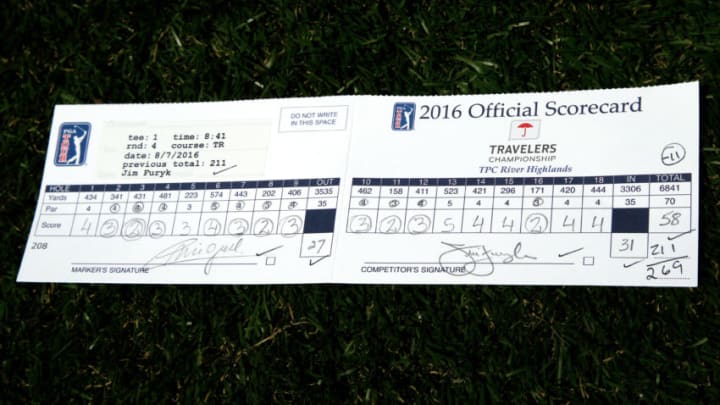After Tom Murray was disqualified at European Q-School for turning in an incorrect scorecard, a multitude of reasons why its so important came to mind. In today’s edition of Golf Tips: We look at the importance of keeping a close eye on your scorecard, even if you aren’t a professional golfer.
Very few people are ever going to be in such a high leverage situation as Tom Murray. That doesn’t mean that you don’t need to keep accurate scores. No one wants to deal with a sandbagging golfer. Any local club matches you play in, accurate score keeping is a must.
Even when you are out playing by yourself, lying on your card isn’t going to make you any better. If anything, it may make you worse. If you are constantly shooting lower on your own or with people who aren’t paying attention, its going to make you and others wonder when you “struggle” when it matters, or even playing with people who are paying attention.
More from Pro Golf Now
- Golf Rumors: LIV set to sign Masters Champion in stunning deal
- Fantasy Golf: Grant Thornton Invitational DFS Player Selections
- Brutal return leaves Will Zalatoris looking towards 2024
- Stars You Know at World Champions Cup Starts Thursday at Concession
- Fantasy Golf: An Early Look at the 2024 Masters Tournament
The main reason this struck a cord with me was seeing the amount of times that it comes up in high school golf. There is no easier sport to cheat on than golf. No matter what, you are either going to get caught, or end up playing seemingly worse golf when people are watching. Even if that is your normal game.
When going back over your card, and trying to think of areas to improve, or aspects of your game that you struggle with, an inaccurate card is no help. Sure, everyone wants to break some magic number they all have. It might be par, it might be 90, it might be 120.
It doesn’t matter if your buddy is 15 shots better than you, besides a little trash talk. They are going to respect you a lot more, and play more even based gambling games on the course with you if they know you are honest. You might find yourself without a playing partner if they have to constantly correct your score.
It’s a good habit to get into ensuring that you record the correct score. There are a few times every year that someone gets caught turning in a score that is incorrect. There are almost no positives from having it happen, unless its a higher score than you actually shot.
Others will start to think mainly a few thoughts about you. You are either going to be watched incredibly closely, thought to be a cheater, or thought to be someone who can’t be trusted.
It lasts past high school, and creates a circle as well. Being honest with your scoring helps you to pass on the importance of keeping good scores. Which helps anyone you are involved with keep good scores. More people will want to play with you as well if they know you are honest.
Recording accurate scores is going to make you more friends on the course. It doesn’t really bother me playing with people who shoot 130. The people who are just out there having fun and enjoying the day, especially if they don’t get to play that often.
If you shoot 80, but it takes you four shots to get to every green, and you seem to be three-putting often, I DO NOT want to play with you. No one wants to hear they got beat by someone that shot 15 strokes worse than them. Its never easy to call these people out either, as it leads to very awkward moments.
Every year i see kids who get disqualified for incorrect scores. Most of them are cheating, and its a good wake up call getting caught. Some of them just screwed up counting, but it makes them buckle down and think harder about each shot they hit on each hole.
This isn’t to say that everyone who turns in the wrong card is a cheater. Tom Murray wasn’t cheating when he turned his in. It’s easy to forget to write down a score, and then go through and subtract or add one trying to remember. Keep a close eye on your scorecard, and you can avoid a multitude of issues on the course. Your playing partners will thank you.
